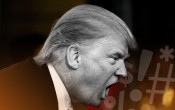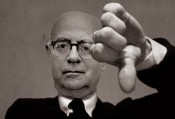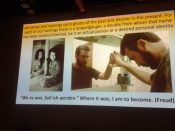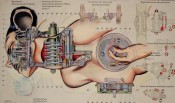Author: ceciliajwugmail-com
Teresa Mendez & Daniel Buccino: The Sublime Psychology of Baltimore
“Lacan locates the unconscious, the sublime nexus of all our psyches, in Baltimore in the morning. The unconscious, he tells us, is like dawn — that threshold between sleep and waking. It’s a pulsating neon sign, ticking time, advertising enjoyment. It is intermittent and fading, present and absent. The unconscious is like Baltimore, with its sublime oscillations between tender and tou...
David Lichtenstein: A Letter from New York
“Psychoanalysis has died many times and in many places. The causes of its repeated demise are often less instructive than the conditions of its resurrection. The cause of death is always a version of the same: it is a discipline that demands too much. It is too austere and takes too long, costs too much, operates too slowly, and produces equivocal results. In short as a general condition, it...
Steven Reisner: Stop Saying Donald Trump is Mentally Ill
“Sigmund Freud had a word for those whose unique gifts permit them to bend reality to their will: artists. According to Freud, the artist “allows his erotic and ambitious wishes full play in the life of fantasy. He finds the way back to reality, however, from this world of fantasy by making use of special gifts to mold his fantasies into truths of a new kind.” Trump has to be understood, the...
Book Launch: “Lacan on Laughter—The new LOL” with Simon Critchley, Patricia Gherovici, Dany Nobus, Manya Steinkoler, and Jamieson Webster
How to fight a situation that seems farcical? When reality reaches absurdity, the subversive power of laughter steps in. Laughter is never innocent, it happens to us, at times inappropriately and inauspiciously. Psychoanalysis is well known for having shed some light on the perennial mysteries of what we do not control – dreams, parapraxes, symptoms, and sexual problems. While the Freudian slip an...
Steven Reisner: Crazy Like a Fox – Evil is Not a Psychiatric Illness
Steven Reisner argues that Trump’s tactical strategies, including lying and bullying, have been such successful political strategies that they cannot be used as evidence of mental illness. I argue that the only delusion in such a successful manipulation of the truth for political advantage is our delusion that Trump is delusional. An analogy would be calling Kane delusional for believing the...
11 Questions to Vanessa Sinclair
“The basic idea is that in order to become a psychoanalyst, one needs three components: one must undergo one’s own analysis, one must see analysands while being supervised by an analyst, and one must study psychoanalysis, take didactics, classes, attend lectures, etc. It’s a field in which there is lifelong learning, and if you are passionate about it, that seems obvious. So these training i...
David Bell: New Barbarisms
All cultures develop their own modes of self-explanation, but such explanations, somewhat like symptoms, inevitably conceal as much as they reveal. In this sense psychoanalysis may be well placed to enter into a critical relation with the forms of consciousness that characterize our age. At the current conjuncture we are witnessing an escalating descent into a kind of institutionalized barbarism w...
Lucas Ballestin: Hipster Politics
Lucas Ballestín analyzes the politics of the hipster, looking to dispel assumptions and use psychoanalytic intuition to explore new ways of thinking the much-hated figure as a response to contemporary political and social conditions. Click here to read the essay published in HKRB
Laurence Rickels: All You Vampires
The title “All You Vampires” summarizes the drift of the presentation by tampering with the title of Robert Heinlein’s time-travel story “All You Zombies” and placing the vampire in the seat of sole survivor (and mourner). To this end I attend to the origin story of the living dead, Richard Matheson’s “I Am Legend.” The contest that reopened at the start of the new millennium between i...
Claire-Madeline Culkin and Ray O’Neill on Narcissism, Mourning & Sexuality
“All names carry ghosts of the pasts and desires in the present. For each of our namings there is a dopplegänger, a double from whom that name has been stolen/inherited, be it an actual person or a desired personal identity” – Ray O’Neill Click here to read a review of the event by Sola Agustsson in Hyperallergenic
Marcus Coelen: Schreber – Text and Transference
Schreber does not stop triggering transference. The Memoirs of My Nervous Illness, published in 1903, drew Jung to draw Freud’s attention to it, leading the latter to write his “Remarks on an Autobiographically Described Case of Paranoia” (1911)—and since then an ever growing textual network of writing, speaking, and gesticulating, is thinking psychosis and practicing its language with Schreber an...
Jill Gentile: Psychoanalysis, Democracy, Desire
“Might it be that democracy’s enduring relevance and comparative advantage is a tribute itself to its very own special, maybe sacred, relationship to the practice of free speech? Might democracy’s status as a beguiling master signifier reveal that its mission is essentially also a psychoanalytic and semiotic one? Might psychoanalysis’s commitment to free association — freedom of thought and ...























